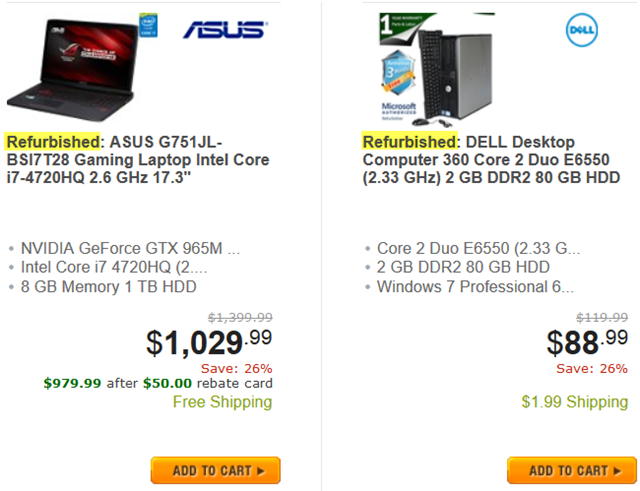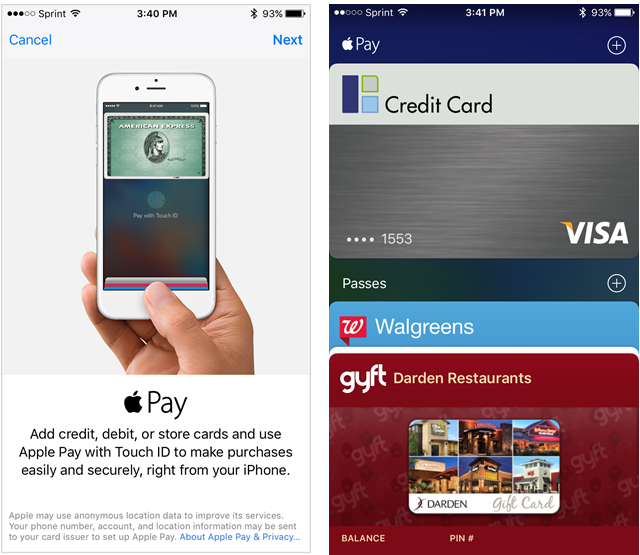If you are one of the many shoppers who make most of their purchases online, it is important to know what phrases and terms mean before shelling out your cash. Some of the terms used by online retailers can be confusing, and you may end up being surprised after it is too late.
Here is a list of words related to online shopping that can help you decide on whether or not you should make your purchase.
Product and Ordering Terms
1. Pre-order is a term used when an item is not yet being distributed but can be ordered ahead of time. You can order the item and pay for it right now, but you won't receive it until the availability date. This is commonly seen with new tech and video game releases.
2. Refurbished describes a previously-used item that has been repaired, restored, or renewed in some way. This is a common term used for electronics, mainly smartphones, tablets, and computers.
For example, a consumer may return their tablet to the manufacturer due to cosmetic damage. The manufacturer may then fix the damage and put it up for sale as a refurbished product, but at a reduced price. However, depending on the manufacturer's reputability, a refurbished product could be as good as new.

3. Back order (or backorder) is a term used when a product you would like to order, or have already ordered, is currently out of stock---but another shipment has already been ordered. This is commonly seen with passing fad purchases.
4. Online tracking (or order tracking) refers to your ability to track an order with the carrier, normally using a unique tracking number. Some carriers may also send you updates via text message or email if you prefer.
For instance, the confirmation email for your order may contain a tracking number for a carrier, such as UPS or FedEx. You can then visit the carrier’s website, enter that number, and see where your order is in the shipping process along with the estimated delivery date.
5. Digital download describes a product you may purchase---such as a video game, book, music, or software---that is delivered to you digitally rather than physically. This could be in the form of a PDF document, an installer file, or something else.
6. Partial shipment is when you order more than one product from a retailer and the items are shipped separately. For example, if you order shoes, socks, and pants, with a partial shipment you may receive the shoes and socks together, but the pants delivered separately.

7. Cruelty-Free typically refers to products that have been created without animal testing. These products are most widely seen in the cosmetics industry, but can also be seen throughout various industries. Burt's Bees, elf, and Garnier are a few of the many brands that have made the shift to cruelty-free products.
8. Ethically Sourced/Sustainably Made products have been made using sources and raw materials that are gathered and processed through sustainable means.

This means that the products themselves should theoretically have very little impact on the planet and the communities that build them.
9. Shopping Cart/Basket is where you will find all the products that you wish to purchase while browsing. As you scroll through products, typically you will find a widget that is an addition sign or a button that says Add to Cart. Here, you will be able to view all of the items you've added to your wish list for an easy checkout.
Payment and Monetary Terms
10. Mobile payments are payments that are made with your mobile device. Unlike credit cards, debit cards, and checks, mobile payments can be made with a smartphone or tablet---as long as you have the relevant app and the merchant accepts it.

11. Envelope budgeting is a way to limit your spending by putting your money into metaphorical envelopes. You may have envelopes for Clothing, Restaurants, and Entertainment with a specific amount available in each for the month. Never spend more than the envelope allows.
12. Payment Installments are a great option if you are making a large purchase. Your credit card will be charged several payments over the course of a few months in order for you to pay off the purchase at a more manageable rate instead of one lump sum.
13. Impulse Purchases are items or services you buy simply because you have an initial desire. This often occurs when we purchase something if you're shopping while in a clouded mindset. A good suggestion is to leave the shopping cart full overnight. If you still love something in the morning, go ahead and buy it.
14. Bitcoin is a form of digital currency that can be sent electronically from person to person without a bank or clearing house as a middleman. It can be used internationally, and you can buy and sell Bitcoins using world currencies, such as US dollars, Euros, and more.
Bitcoin can be used to buy items from online retailers who accept it and provides those retailers with lower fees and less risk of fraud.
15. Returns Policy are the regulations that a company has set in place regarding a customers ability to return a product. Some returns policies will offer full refunds if the product is undamaged, while others simply offer in-store credits. Be sure to check out a return policy before purchasing to avoid a regretful mishap if the shoes don't fit.
Security and Privacy Terms
16. Authentication is how a website identifies who you are, usually through login credentials (such as username and password). When you enter your login information, the site authenticates that combination before allowing you access to your account.
Since online payment information is usually stored on your accounts, it's best to adhere to good security practices so that hackers don't gain access.
17. Two-factor authentication (or two-step verification) describes an identification process that uses multiple login credentials in order to provide enhanced security.
A site may ask you for your username and password as the first step, and then send a text message with a security code that you must type in as the second step. This method provides an extra layer of security.
Other Miscellaneous Terms
18. Live support (or live chat) is a feature you may see while shopping on sites that offer immediate assistance. If you have any questions, concerns, or problems, live support allows you to chat in real-time with a representative right on the website rather than calling them on the phone.

19. Newsletter is a word you may see when shopping, typically when going through the checkout process. Many stores offer an electronic newsletter that you can sign up for and receive via email on a regular basis. Newsletters might include company news, but most often contain special deals, sales, and promotions that the store offers from time to time.

20. Retail therapy is not a technical or merchant term, but a phrase used to describe those who shop to improve their mood. It tends to go hand-in-hand with impulse shopping.
21. Discounts, coupons, or promo codes are sometimes used interchangeably but generally refer to a number or letter combination that you can enter on the shopping site in order to unlock special deals. You may receive these types of codes via email from the retailer or even see them displayed when you visit the store's website. There are some great websites that automatically search for discounts for you while your browse.
22. FAQ refers to Frequently asked questions. If you have a specific question relating to products, shipping, returns, management and more, typically you can find the answer on the FAQ page. This page is almost like the customer manual for any website. Worst case scenario, you can use it to find the company contact information.

Keeping Up With New Terms
As technology evolves, new terms in the online shopping world are sure to pop up. Twenty years ago, the terms mobile payments or live support were unheard of when buying clothes, electronics, or appliances.
So if you shop online regularly, try to keep up with new terminologies to protect yourself from unpleasant surprises. You should also check out some great tips on how to shop securely, confidently, and safely online.
0 Comments